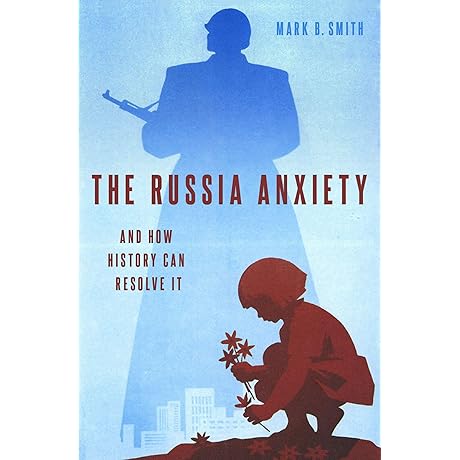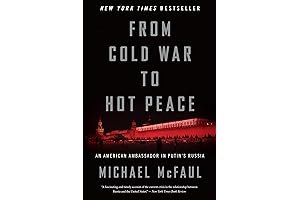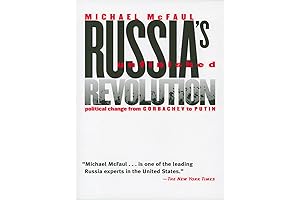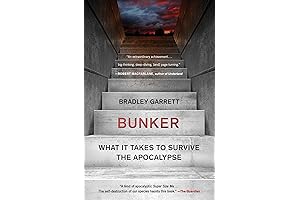· russia · 6 min read
From Cold War to Hot Peace: Unraveling Putin's Russia
A firsthand account of US-Russia relations from a former US ambassador, exploring the complexities and challenges.
In 'From Cold War to Hot Peace,' former US Ambassador to Russia Michael McFaul offers a gripping account of his time navigating the tumultuous relationship between the two nations. This book is an essential guide for understanding the current geopolitical landscape and the challenges of diplomacy in the 21st century.
Overview

PROS
- Captivating insider's perspective on the complex relationship between the US and Russia.
- Offers a nuanced understanding of Putin's motivations and strategies.
CONS
- Can be somewhat dense and academic for some readers
- Lacks a broader global perspective on US-Russia relations
Michael McFaul's "From Cold War to Hot Peace" is a timely and insightful account of his experiences as the US ambassador to Russia during a period of heightened tensions between the two countries. McFaul provides a balanced and nuanced perspective, drawing on his personal interactions with Putin and other key figures to shed light on the complex dynamics of US-Russia relations.
The book's strength lies in its ability to humanize the often-opaque world of international diplomacy. McFaul's vivid descriptions and anecdotes offer a glimpse into the personalities and motivations of those who shape global affairs. He provides a fascinating account of Putin's rise to power and his efforts to reassert Russia's influence on the world stage.

PROS
- Provides a thorough analysis of Russia's political transformation over several decades
- Offers unique insights into the post-Cold War era and the challenges faced by Russian leadership
CONS
- Some may find the book to be overly detailed, making it a challenging read for casual readers
- Lacks a strong narrative structure, which can make it difficult to follow
Michael McFaul's 'Russia's Unfinished Revolution' offers a comprehensive overview of Russia's political journey from the Gorbachev era to the present day under Putin. McFaul, a former US ambassador to Russia, draws upon his firsthand experience and extensive research to provide a nuanced analysis of the country's evolving political landscape.
One of the strengths of the book is its detailed examination of the post-Cold War period in Russia. McFaul delves into the challenges and opportunities faced by leaders such as Gorbachev and Yeltsin, and sheds light on the factors that contributed to Russia's political transformation. The book also provides insights into the rise of Putin and his consolidation of power, offering a deeper understanding of Russia's current political trajectory.

PROS
- Unveils McFaul's firsthand experience as a former US ambassador to Russia, providing insider insights.
- Proposes actionable strategies for building a more stable and cooperative relationship between the United States and Russia.
CONS
- May not delve deeply enough into the complexities of contemporary Russia-US relations for some readers.
- Some readers may prefer a more concise and focused analysis of the topic.
In 'From Cold War to Hot Peace', Michael McFaul, a former US ambassador to Russia, offers a compelling analysis of the post-Cold War geopolitical landscape and the challenges and opportunities it presents. Drawing on his extensive diplomatic experience, McFaul provides a nuanced examination of US-Russia relations, highlighting historical context, current dynamics, and potential pathways towards a more constructive and peaceful coexistence.
McFaul argues that despite the end of the Cold War, the United States and Russia remain locked in a state of 'hot peace', characterized by ongoing tensions and mistrust. To break free from this impasse, he proposes a series of bold and pragmatic strategies, advocating for increased diplomatic engagement, economic cooperation, and cultural exchanges. McFaul underscores the importance of understanding Russia's historical grievances and security concerns while simultaneously holding it accountable for its actions.

PROS
- McFaul's analysis of the Cold War is incisive and insightful.
- The book provides a nuanced understanding of the challenges and opportunities facing the United States in the 21st century.
- McFaul's writing is clear, concise, and engaging.
CONS
- The book's focus on the Cold War may not be of interest to all readers.
- McFaul's recommendations for US foreign policy could be seen as too idealistic.
Michael McFaul's The Art of Diplomacy is a timely and important book. In the face of escalating global tensions, McFaul offers a clear-eyed and incisive analysis of the challenges and opportunities facing the United States in the 21st century. Drawing on his own experiences as a diplomat and scholar, McFaul provides a nuanced understanding of the art of diplomacy and the ways in which it can be used to resolve conflict and build peace.
McFaul's book is a valuable resource for anyone interested in international relations. His analysis of the Cold War is particularly insightful, and he provides a fresh perspective on the lessons that can be learned from that era. McFaul also offers a number of concrete recommendations for US foreign policy, which are sure to spark debate and discussion. Whether you agree with his conclusions or not, The Art of Diplomacy is a must-read for anyone who wants to understand the complex world we live in.
'From Cold War to Hot Peace' provides a comprehensive analysis of Russia's political transformation from Gorbachev to Putin, shedding light on the underlying causes of the current tensions between Russia and the West. McFaul's unique insights and firsthand experiences offer valuable perspectives on the challenges and opportunities of diplomacy in this complex geopolitical landscape.
Frequently Asked Questions
What is the central theme of 'From Cold War to Hot Peace'?
The book explores the transformation of US-Russia relations, from the Cold War era to the current tensions.
Who is the author of 'From Cold War to Hot Peace'?
The book is written by Michael McFaul, a former US Ambassador to Russia.
What is the significance of 'From Cold War to Hot Peace'?
The book provides valuable insights into the complexities of Russia's political evolution and the challenges of diplomacy between Russia and the West.
What time period does 'From Cold War to Hot Peace' cover?
The book covers the period from the Gorbachev era to the present day, focusing on the evolution of US-Russia relations.
What is the writing style of 'From Cold War to Hot Peace'?
McFaul writes in a clear and engaging style, offering a blend of personal anecdotes and geopolitical analysis.







